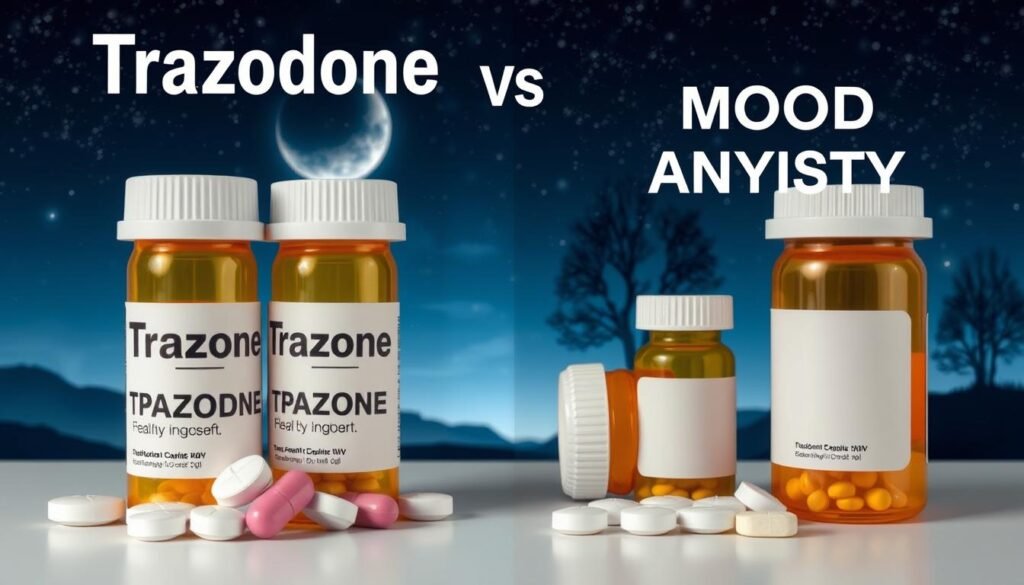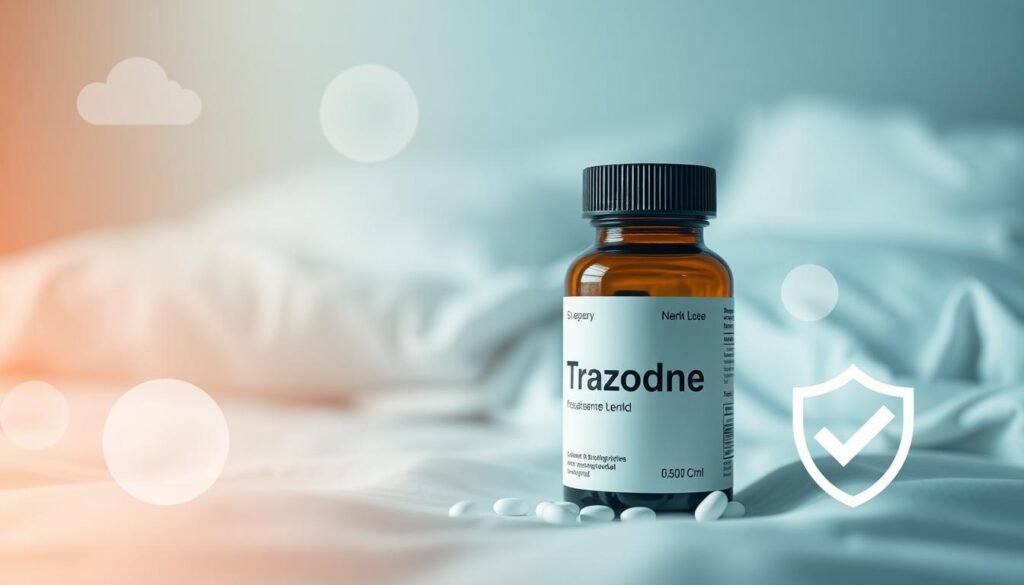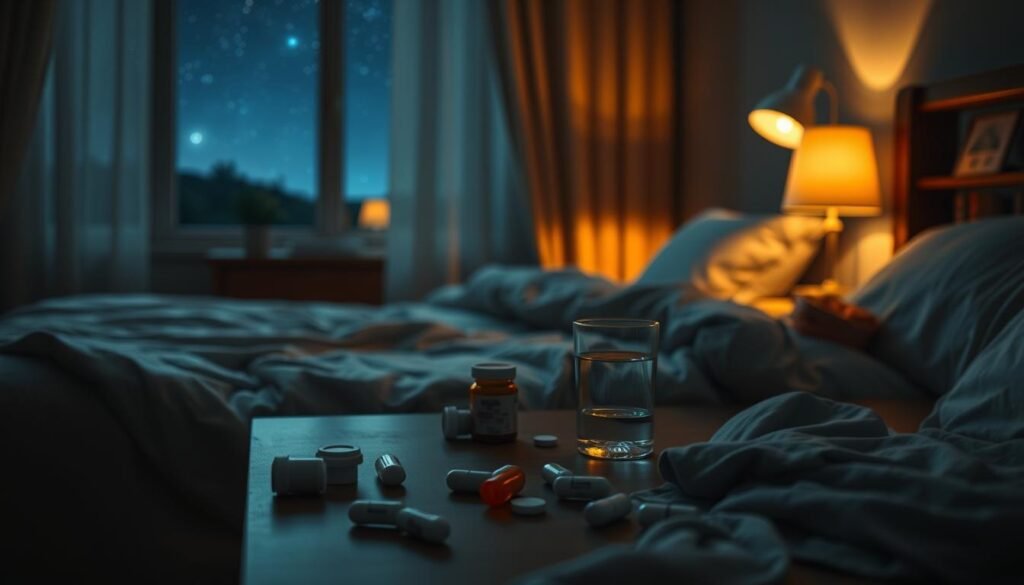Did you know around 17.3 million American adults have major depression each year? Finding the right treatment is often difficult. Trazodone, approved by the FDA in 1981, is significant in this area. It’s not only for depression but also helps with sleep issues thanks to its sedative effects.
This piece digs into trazodone’s various uses, including how it works and its pros and cons. Patients should always talk to their doctors to keep things safe and effective. If you want more info, especially on safety and drug interactions, check out Mayo Clinic.
Key Takeaways
- Trazodone is effective for both treating depression and serving as a sleep aid.
- Side effects can include drowsiness, dizziness, and nausea.
- Patients may experience sedative effects within 30 minutes when used as a sleep aid.
- Monitoring by healthcare providers is crucial to manage dosing safely.
- The drug is not classified as controlled, making it less restricted in prescriptions.
- Regular consultations can help avoid severe adverse reactions, such as serotonin syndrome.
Introduction to Trazodone and Its Uses
Trazodone is a type of medication known as a serotonin antagonist and reuptake inhibitor (SARI). It was first made to treat depression. But, it is also used for other problems like anxiety and sleep disorders, especially insomnia.
About 121 million people worldwide suffer from major depressive disorder, but fewer than 25% get the right treatment. Trazodone is unique because it works in two ways. It targets the serotonin transporter and blocks serotonin receptors. This makes it a great way to manage depression and also helps with sleep problems.
At low doses, trazodone is really good for sleep issues. Studies show that taking 25 mg to 100 mg can greatly improve sleep. It helps people fall asleep faster and enjoy better sleep quality. This makes it a top choice for those with insomnia.
Trazodone has fewer negative effects compared to older antidepressants and sleep medicines. It’s not addictive, has minimal side effects, and is well-tolerated by older people. This makes it a preferred treatment for many doctors and patients.
Overview of Trazodone as an Antidepressant and Sleep Aid
Trazodone has become an important treatment option since the 1960s. It was approved by the FDA in 1981 for major depressive disorder (MDD). Beyond depression, it’s now used off-label to help with sleep and anxiety. This shows how doctors’ views on Trazodone have changed over time.
Development and Approval History
In the beginning, some doctors were unsure about prescribing Trazodone. They worried about side effects like dizziness and fainting. But, they found it works well at low doses for insomnia. This led to it being more widely used. By 2019, it was the 25th most prescribed drug in the U.S. Almost 20% of Americans with insomnia used it for sleep in 2022.
Indications for Use in Depression and Insomnia
Even though Trazodone isn’t officially approved for insomnia in the U.S., doctors still prescribe it. They usually give small doses for sleep, between 50 to 100 mg at bedtime. Studies show doses from 25 to 150 mg can effectively aid sleep.
Trazodone is affordable because it’s a generic drug. It may not be as popular in the UK for insomnia, but it’s valued for depression and anxiety. For a detailed look at its off-label uses, check out this comprehensive treatment guide.
| Year | Rank | Prescriptions (in millions) | Notable Uses |
|---|---|---|---|
| 2019 | 25th | 5 | Major depressive disorder, insomnia |
| 2022 | N/A | N/A | 20% of insomnia cases |
How Trazodone Works: Mechanism of Action
Trazodone has a special way of tackling depression and sleep problems. It works with serotonin in the brain in a complex way. Understanding the trazodone mechanism of action helps us see how it helps people feel better.
Serotonin Receptor Antagonism
Trazodone is good at doing something called serotonin receptor antagonism. It focuses on certain serotonin receptors, mainly the 5-HT2A and 5-HT2C. By blocking these receptors, it balances serotonin levels. This balance is key for mood stability and reducing anxiety.
This action not only helps with depression symptoms. It also helps many people sleep better.
Reuptake Inhibition Mechanism
Another key action of trazodone is called reuptake inhibition. It stops the serotonin transporter (SERT) from taking back serotonin into the presynaptic neuron. This leads to more serotonin in the synaptic cleft.
Having more serotonin available is critical in fighting depression and anxiety. It makes people feel more at ease and relaxed.
Trazodone Dosage Guidelines
It’s important to know the right trazodone dosage for treating major depressive disorder and sleep issues. This medicine is prescribed in different strengths. It depends on what the person needs and how they react to the medication.
Initial Dosing Recommendations
The starting dose for major depressive disorder is usually around 150 mg per day. Sometimes, doctors may start with 100 mg daily to lessen side effects. For sleep disorders, a dose between 50 mg to 100 mg is suggested. Starting with a lower dose helps people adjust better and see how they respond to the medicine.
Adjusting Dosage for Specific Conditions
Adjusting the dosage is often needed, based on how a patient is doing and their treatment response. For anxiety disorders, the initial dose is often 75 mg daily. If there’s little relief, the dose can be increased. Some may need up to 300 mg daily for their depression. It’s vital to follow dosing instructions closely. This helps prevent serious side effects, like serotonin syndrome.
Benefits of Trazodone for Sleep Disorders
Trazodone is a good choice for people who have trouble sleeping, like those with insomnia. Its calming effects help improve sleep quality. Many report that trazodone makes it easier to relax, resulting in better sleep.
Trazodone is different from other sleep meds because it’s not addictive. It’s not considered a controlled substance, making it a safer option for long-term use. Doctors often choose it for treating ongoing sleep issues because of this.
Generic trazodone is easy to get and doesn’t cost much. This makes it a great option for handling sleep problems without spending a lot. People can get a good night’s sleep again without spending too much.
Besides helping with sleep, trazodone is also an antidepressant. It can help with depression, which is great for those who can’t sleep because of mood issues. For the best advice on using trazodone, it’s a good idea to talk to a healthcare provider. You can learn more about the benefits of trazodone by consulting a professional.
| Benefit | Description |
|---|---|
| Improved Sleep Quality | Trazodone promotes deeper and more restful sleep, essential for those struggling with insomnia. |
| Non-Addictive | Unlike many sleep aids, trazodone does not carry a risk of dependency. |
| Cost-Effective | Generic versions are available, making trazodone an affordable option for many patients. |
| Dual Functionality | As an antidepressant, it can help alleviate mood disorders that may hinder sleep. |
Trazodone vs. Other Antidepressants
Comparing trazodone with other antidepressants highlights its effectiveness and side effects. This is key for those picking a treatment that fits their needs.
Comparative Efficacy
Trazodone matches the effectiveness of popular antidepressants like SSRIs and SNRIs. Many switch to trazodone due to the side effects of other medications. About 23.2% of patients need to switch their antidepressant because of side effects or efficacy. Trazodone is a good choice for those who face sexual dysfunction or can’t sleep on other meds.
Side Effects Profile Comparison
The side effects of trazodone can be a deciding factor for many. It often causes drowsiness, dry mouth, and dizziness. Unlike trazodone, other antidepressants like bupropion have fewer sleep issues. Some, like Ambien, may lead to complex sleep behaviors. Trazodone doesn’t have the anticholinergic side effects seen with older drugs, making it more appealing to many. However, it’s important to know about trazodone’s serious warning about suicidal thoughts in young people.

Trazodone Side Effects: What to Expect
Trazodone can help many, but it has side effects. It’s important to know these effects to make good choices. Common side effects include:
- Drowsiness or fatigue
- Headaches
- Nausea
- Constipation
- Dry mouth
Some rarer side effects are orthostatic hypotension and priapism. Very serious ones like serotonin syndrome and arrhythmia are rare. If you see worrying symptoms, talk to your doctor quickly.
Common and Less Common Side Effects
Those on trazodone might see various side effects. There are common and less common types. Below is a chart showing these effects:
| Effect Type | Common Side Effects | Less Common Side Effects | Serious Side Effects |
|---|---|---|---|
| Frequency | Up to 5% of users | Less than 1 in 1,000 users | Rare occurrences |
| Examples | Drowsiness, Dry Mouth | Priapism, Orthostatic Hypotension | Seizures, Liver Problems |
Managing Side Effects Effectively
It’s key to manage trazodone’s side effects well. You might need to change the dose or try a new medication. Lifestyle adjustments can also help. Always get advice from a doctor for serious or ongoing issues. Talk to your healthcare provider to figure out the best plan for you.
Trazodone Safety Profile and Precautions
Trazodone has a good safety profile and is widely used. It’s important for certain groups to be careful with it. This includes young people under 24 and those with health issues. Knowing the risks and taking care can make trazodone safer to use.
Risk Factors for Specific Populations
Teens and young adults may face higher risks of thinking about or trying suicide. The FDA has issued a serious warning about this. People with heart issues need to be cautious, too. Trazodone might affect blood pressure and heart rhythm.
Elderly people often handle trazodone well. Starting with small doses, like 25-50 mg, can be safer and still work for sleep or anxiety. Doctors should watch older patients closely. This is especially true when they take other medicines. Sometimes, the dose of trazodone needs changing based on the patient’s needs.
Before starting trazodone, talk openly with your doctor. This is very important for those with conditions like bipolar disorder. The drug could trigger a manic episode. Regular check-ins with the doctor will help make sure the treatment is working and staying safe. Learn more about this topic by checking out this resource.

Interactions with Other Medications and Substances
Trazodone can be risky with certain medicines and substances. Knowing about trazodone interactions is key for safety. Taking it with drugs called monoamine oxidase inhibitors (MAOIs) raises the risk of a serious condition known as serotonin syndrome. This group includes medications like selegiline, phenelzine, or isocarboxazid.
Some other antidepressants, like citalopram and fluoxetine, also increase serotonin syndrome risk with trazodone.
Blood thinners such as apixaban and warfarin can lead to more bleeding if used with trazodone. Heart medicines, like amiodarone or sotalol, may cause severe heart rhythm problems. Also, pain relievers called NSAIDs, including ibuprofen, heighten bleeding risks too.
Some antibiotics and antifungals can make trazodone less effective. Medicines like clarithromycin and rifampin are examples. Painkillers like oxycodone or tramadol, when used with trazodone, could make you very sleepy. Herbs like St. John’s wort also pose a risk by raising serotonin levels too much.
Talking about all the medicines you take with healthcare providers is really important. This helps ensure you’re treated safely and effectively when using trazodone.
| Medication Type | Interaction Risk |
|---|---|
| MAOIs | Increased risk of serotonin syndrome |
| Certain Antidepressants | Heightened risk of serotonin syndrome |
| Blood Thinners | Elevated bleeding risk |
| Heart Rhythm Medications | Potential for serious arrhythmias |
| NSAIDs | Increased bleeding risk |
| Opioids | Increased sedation and serotonin syndrome risk |
| Antibiotics | Potential ineffectiveness of trazodone |
| Herbal Supplements | Increased serotonin levels, risking serotonin syndrome |
Trazodone User Reviews and Experiences
Trazodone user reviews show different experiences, with many finding it effective for depression and sleep issues. Users often note a big improvement in life quality. They talk about better mood and sleep, feeling well overall.
Overview of User Feedback
The overall user rating for trazodone is 3.6 out of 5 stars, showing mixed feelings. There’s a clear split in effectiveness ratings:
| Rating | Number of Reviews |
|---|---|
| 5 stars | 782 |
| 4 stars | 446 |
| 3 stars | 369 |
| 2 stars | 203 |
| 1 star | 395 |
For ease of use, the ratings are more positive. Users find it easy to use daily:
| Rating | Number of Reviews |
|---|---|
| 5 stars | 1249 |
| 4 stars | 416 |
| 3 stars | 235 |
| 2 stars | 118 |
| 1 star | 177 |
Impact on Quality of Life
Many reviews talk about the positive impact of trazodone on life quality. It helps not just with sleep but also with how they feel daily. People who had chronic sleep problems gave it a high rating of 5.0.
Although many reports are good, some users mention side effects like dizziness and dry mouth. The most voted negative review had 224 helpful upvotes. Even with good experiences, it’s important to talk to a doctor about using trazodone.

When to Consult a Healthcare Professional
Before using trazodone, talk to a healthcare professional. It’s crucial to keep your doctor in the loop for the best treatment. Contact them right away if you feel more depressed.
If trazodone makes you feel dizzy or confused, tell your healthcare provider. These side effects may mean your dose needs changing. Your doctor can adjust your treatment if needed.
Staying in touch with your health providers helps manage your health better. This ensures a full approach to care, leading to improved health.
Conclusion
Trazodone stands out as a vital option for treating depression and insomnia. It helps balance serotonin levels, which can improve mood and sleep. This drug is becoming popular as it seems effective and carries a low risk of dependence.
Yet, deciding to use trazodone requires careful thought. Healthcare authorities suggest looking at other options first for long-term sleep problems. Still, many users say trazodone improves their sleep and reduces depression signs. This makes it an important option to consider.
Talking with healthcare providers is key to finding the best treatment. Trazodone can give relief to those struggling with depression and insomnia. But it’s important to use it as part of a broader treatment plan that fits the patient’s specific needs.